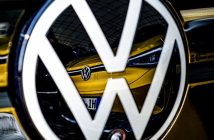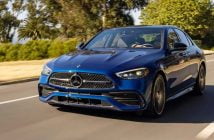+++ With the supremacy of the McLaren P1, Porsche 918, and Ferrari LaFerrari being contested by the new crop of hypercars coming from Mercedes-AMG or Aston Martin, it seems other companies are looking to join the party. According to the latest word off the rumor mill, none other than BMW is considering building a hypercar that would go against the Mercedes-AMG Project One and Aston Martin Red Bull Valkyrie. The only thing it’s at the bottom list for the BMW executives, with BMW M Vice President of Sales and Marketing, Peter Quintus, only admitting it would definitely use a hybrid powertrain, with concepts ready for development, if needed. “The 2 big factors beyond that are our development capacity and also the investment required”, said Quintus. “We would love to do it. Our engineers would love to do it. But there has to be the money to do it. We have concepts. If you said tomorrow, go, we know already what it would look like”. This won’t be the first-time BMW has mulled the development of a true hypercar; we can see in the attached picture the M1 Hommage concept from 2015, for example. Back then there were numerous reports flying around with BMW working with McLaren to do a 750-horsepower hybrid hypercar. BMW’s halo car (the i8) is for now safe, also because the automaker is looking to push its life with the introduction of a convertible version, as well as the refreshed coupe version due with a power upgrade in 2018 or 2019. +++
+++ HONDA moght used the Passport moniker again. The name was used for a model on sale between 1993 and 2002, though it wasn’t the spectacular success they were expecting since it was merely a rebadged Isuzu Rodeo. The nameplate was thus killed off and the bigger Pilot came to life, but it now seems the company is mulling the proverbial second chance for the name. Apparently, the rumor mill has caught wind of Honda filling for trademark with the U.S. Patent and Trademark Office this past December, and it allegedly specifically rekindles the original trademark application made for the Passport back on May 11, 1993. This bodes well with the previous rumors about the introduction of a smaller version of the Pilot with just 2 rows of seats; a model that would fit the slot in between the CR-V and the regular Pilot. Production of this small Pilot (or Passport) is also coming up fast, with reports of September 2018 kick off at Honda’s Alabama plant. This means the automaker will debut the model either this fall, the coming winter or the spring of 2018. The model would use the Pilot powertrain rather than the one found on the CR-V in America: 3.5-liter V6 with up to 280 horsepower and 355 Newton-meters of torque. +++
+++ The Shanghai Motor Show is always an eye-opener, from the sheer scale of the event to the ‘here today, gone tomorrow’ supercar makers that seem to pop up at each visit then vanish from trace. Western car companies are putting more and more effort into this lucrative market, while plenty of the Chinese makers continue to tease us with promises of heading to Europe with innovation and value (although judging by some of the tired-looking designs on display, we’d be quite happy if many of them stayed in the Far East). However, while one Chinese car brand purported to be coming to Europe, Qoros, finally confirmed that it wasn’t, one of its big rivals seemed to be stealing the show. LYNK&CO , the new global car brand launched late last year by the Chinese owner of Volvo, Geely, and led by many former Volvo guys, was launching its smart-looking, if not groundbreaking 01 SUV and similarly styled 03 saloon. Yet in its short lifetime, Lynk & Co seems to have captured the imagination of the Chinese car buying public. What surprised me most was not the crowds rammed on to the stand, but the age of those flocking to see the cars. They were young car fans, very western in their outlook, with those I spoke to telling me they had fallen in love with Lynk & Co because the brand was “new and cool”. The company is set to arrive in the UK in late 2018/early 2019 and has already announced it will sell its cars through a subscription service and offer lifetime warranties, and that it hopes to be the most connected car brand, starting with free traffic data. The premium car market has seen disruption from Tesla, but mainstream makers have long been in need of a similar jolt. I reckon Lynk & Co could be about to deliver it. +++
+++ A new report indicates the MERCEDES SLC won’t be renewed for another generation. According to my sources, the SLC has disappeared from the company’s product cycle plan. If true, it’s likely the SLC will soldier on for a little while yet, with the car having received a facelift and a new name just last year. The small 2-seat convertible hardtop began life 2 generations ago in 1996. Until recently known as SLK, it helped to kick off a boom for convertible hardtop vehicles. Many car companies, including Mitsubishi with the Colt CC and Daihatsu with the Copen, brought out vehicles with folding hardtops. Thanks to a general decline in consumer interest for speciality sports cars, the boom has fizzled out, leaving the SLC as one of the last players on the field. Last year, Dieter Zetsche, head of Mercedes-Benz, indicated that the SLC’s replacement may be switched onto the A-Class’ front- and all-wheel drive platform. That idea now seems to be dead.As a report late last year indicated, the larger SL will move onto a platform shared with the Mercedes-AMG GT two-door range. While the AMG GT coupe and convertible will remain strictly two-seat propositions, the SL will be larger and feature a 2+2 seating layout. In line with current trends, the SL will ditch the current car’s folding hardtop in favour of a traditional fabric roof. +++
+++ For the first time seen at the 2009 edition of the Geneva Motor Show, the Yeti SUV is currently SKODA ’s oldest model in the range, but that won’t go on for long. And because today it’s really hard to hide your new cars when prototype testing unless you use a huge amount of camouflage, here’s footage of the second-generation Yeti going around while undergoing trials on the roads of Czech Republic. The official premiere is setup for May 18, oddly in Stockholm, Sweden, but I’m just going to take this with a grain of salt. The design looks uninspiring, but that could be due to the low resolution and the fact that Skoda camouflage typically has layers hiding the real body panels. The uncanny small wheels are also something that will be lost in translation to the production car, though as far as we can see this is a case of shrinking the Kodiaq. Aside from the crossover’s copied (since it’s the same brand they say “inspired”) styling, there are some issues across the rumor mill with the possible name change. A recent report and the video itself claim the Yeti will be renamed to the Karoq; fans might be displeased since the Yeti is a beloved moniker. Technical specs should mirror the Volkswagen Tiguan and the Seat Ateca, though the Yeti successor should come up as being larger than the two because of its usual practice of providing ample interior space. +++
+++ Car manufacturing in the UNITED KINGDOM reached its highest level in 17 years last month, with British car makers producing 170,691 across the 4 weeks. According to the Society of Motor Manufacturers and Traders (SMMT), export demand helped the country increase production by 7.3% compared with the same month in 2016. In the year to date, 471,695 cars have been produced, which is 33,305 more than the same point last year. Output was driven by overseas demand, which helped to offset a decline at home, with domestic demand down 4.3% this quarter. SMMT chief executive Mike Hawes said “UK car manufacturing is accelerating thanks to billions of pounds of investment committed over the past few years. A large proportion are the latest low emission diesels and it’s essential for future growth and employment that we encourage these newer, cleaner diesels onto UK roads and avoid penalising consumers who choose diesel for its fuel efficiency and lower CO2 emissions. Much of our output goes to Europe and it’s vital we maintain free trade between the UK and EU or we risk destroying this success story”. Last month, the bestselling cars in the United Kingdom were 1: Ford Fiesta – 25,428 registrations, 2: Ford Focus – 17,119 registrations, 3: Vauxhall Corsa – 21,305 registrations, 4: Volkswagen Golf – 19,223 registrations, 5: Nissan Qashqai – 19,071 registrations, 6: Vauxhall Astra – 17,915 registrations, 7: Mercedes-Benz C-Class – 15,461 registrations, 8: Volkswagen Polo – 15,453 registrations, 9: Mini – 12,973 registrations, 10: Nissan Juke – 12,935 registrations. +++
+++ The VOLKSWAGEN Group has reportedly taken the first steps to selling off motorcycle maker Ducati. Sources have told that the Volkswagen Group has engaged Evercore, a banking advisory firm, to sound out possible buyers for Ducati. Last year, Ducati recorded sales of 593 million euros, a turnover of around 100 million euros and a profit of roughly 50 million euros. Buyers are likely to pay between 1.0 and 1.5 billion euros for the motorcycle brand. Audi, Volkswagen’s mainstream luxury arm, purchased Ducati for 860 million euros in 2012. If a suitable buyer can’t be found or a suitable purchase price agreed upon, Volkswagen is apparently willing to list the motorcycle manufacturer on the stock market. Funds raised by offloading of Ducati would be used to offset some of the costs related the company’s Dieselgate emissions cheating scandal, which could cost the company over $26 billion in fines, compensation, payouts, environmental remediation and fixes. This money, as well as across-the-board cost cutting efforts, will also help the Volkswagen Group in its pivot towards electric vehicles. This isn’t the first time that Volkswagen has reportedly considered selling assets to deal with the aftermath of the Dieselgate saga. Back in mid-2016, Bloomberg report said the German automaker was considering Ducati motorcycle and MAN truck divisions. A few months later, the company went on the record in the German press to state it was “not thinking of selling parts of our brands”. Volkswagen, Audi and Ducati all gave no comment to Reuters in response to its article. +++



